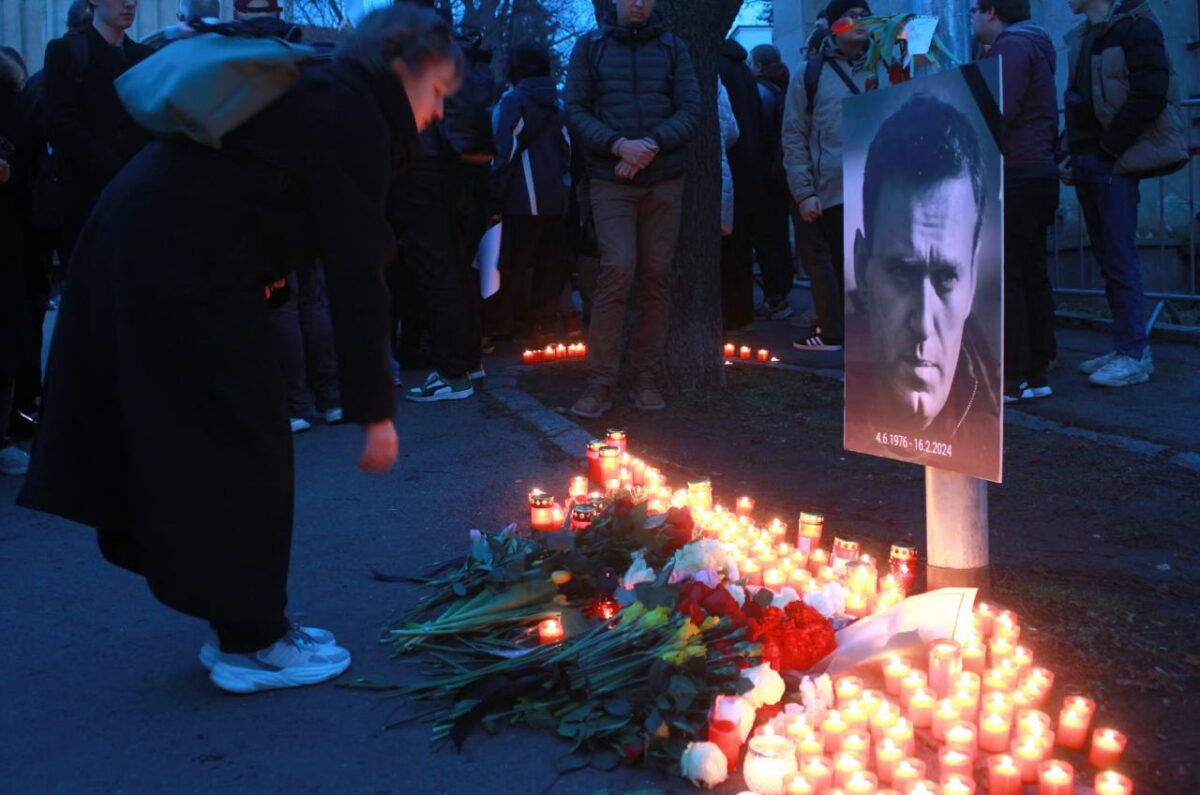Mikhail Khodorkovsky: After Navalny’s death, the West must get tougher with Putin

I call on Russians to demonstrate their resistance by writing the name “Alexei Navalny” on their ballot papers on March 17, in tribute to the regime’s latest and most prominent victim.
Russian opposition leader Alexei Navalny was a heroic opponent to President Vladimir Putin, and he has paid the ultimate price. Putin murdered Navalny.
We salute Navalny’s courage and condemn the cowardice of his murderer — a leader so weak, he cannot tolerate any real opposition to his rule. Now Putin has Navalny’s blood on his hands, as he has the blood of so many before him.
Let this be a wake-up call to the world — not that one should have been needed: Putin’s murderous regime is illegitimate and should be treated as such.
Putin perpetrated this sickening murder one month before the sham officially known as the “Russian presidential election” takes place. Elections in Russia are neither free nor fair. Any genuine opponent to Putin is banned from running, if they haven’t been imprisoned, forced into exile or, as the fate of Navalny makes so tragically clear, killed.
The West must stop indulging this charade and declare this election and its result illegitimate. The last time a “Russian presidential election” took place, the West’s response was weakness and appeasement.
I hope it does not repeat the same mistakes.
To no one’s surprise, that election, held in March 2018, delivered the usual result. Putin won a handsome majority — though smaller than in more traditional dictatorships — as he comfortably bested a couple of stuffed suits from the more ludicrous ends of Russia’s political spectrum.
As such, it was the usual charade, but what differed and warranted a firmer response from the West was that Putin also conducted the “election” in Ukrainian territory it had forcibly annexed — namely, Crimea.
So, how did the world respond to this violation of a neighbor’s sovereignty? U.S. President Donald Trump made a congratulatory phone call, as did then European Commission President Jean-Claude Juncker. France and Germany avoided using the word “congratulate,” but wished Putin success in his next six years in office. And then, the world traveled to Russia for the football World Cup, the 21st century equivalent of the 1936 Berlin Olympics.
Six years on, during which Putin has unleashed hell on Ukraine, plunged the world into turmoil and now murdered a prominent opponent, how will the West respond this time?
As it stands, Putin is poised to force parts of Ukraine, which were occupied through a genocidal war of aggression, to take part in his predetermined re-election. Moreover, the Russian leader is now wanted for war crimes by the International Criminal Court, notably for the kidnapping of Ukrainian children. These reasons alone were already sufficient to declare this election — and his rule — illegitimate.
The Parliamentary Assembly of the Council of Europe (PACE) had the right idea last October, recognizing “Putin as illegitimate after the end of his current presidential term” and “ceas[ing] all contact with him, except for humanitarian contact and in the pursuit of peace.”
I question whether any contact with Putin could help bring about the pursuit of peace — only stronger military backing for Ukraine will do that. Furthermore, I do not believe sustainable peace will be possible as long as his crooked regime remains in power. He is a danger to the world. Nevertheless, I welcome PACE’s resolution and call on others to follow suit.
Putin has effectively declared himself dictator for life. In 2020, the Duma — Russia’s obedient assembly — changed the country’s constitution to lift its presidential term limit. And in response, the 2021 European Parliament Resolution on the direction of EU-Russia political relations clearly stated that “the EU should condemn any attempt by President Putin to remain in office beyond the end of his current and final presidential mandate on 7th May 2024 on the basis of the 2020 constitutional amendments, which Parliament has assessed as ‘illegally enacted.’”
It’s now time to see what this means in practice.
Putin will never leave office voluntarily, and the Russian people are being denied any real alternative. Navalny has now been murdered. Other opponents, such as Vladimir Kara-Murza — who was the subject of poisoning attacks in 2015 and 2017, as Navalny was in 2020 — are in prison. And organizations like Open Russia, which I cofounded to engage Russian civil society in the work of genuine democracy, are banned as “undesirable.”
And yet, there is still appetite among the Russian public to vote for a candidate opposing Putin’s war and corruption. Hence, the unexpected success of Boris Nadezhdin, a little-known liberal politician who gathered hundreds of thousands of signatures backing his candidacy and was polling at 10 percent — a remarkable achievement given that the media in Russia is Putin’s personal cheerleader. Of course, Nadezhdin has now been banned from running, but his success has shown that Russians will queue to show support for a genuine opponent.
I now call on those Russians to demonstrate their resistance by writing the name “Alexei Navalny” on their ballot papers on March 17, in tribute to the regime’s latest and most prominent victim.
And after Putin “wins” in March, Western leaders should no longer indulge this obscenity. If they have to talk to Putin, it should be as hostage negotiators talk to criminals, but they cannot give him the slightest trappings of legitimacy. They should finally show that their fine words on the inviolability of European borders are worth the paper they’re written on.
Western leaders must never again feed Putin’s belief that being a criminal boss is the same as being a head of state. And no one should kid themselves that he will respect new agreements any more than previous ones if they aren’t backed up by force.
Declaring Putin’s regime illegitimate would also deal a heavy blow to those who, disgracefully, continue to do business with the Kremlin despite sanctions. They too should know that their corrupt deals with this regime are worth nothing.
Such a declaration would promote the federalization and democratization of Russia in the future as well, as nonrecognition would carry implications for Putin’s successor. If the process by which Putin empowered himself was declared illegitimate, then so too would the process of appointing whoever came next. Denied international legitimacy, they would then need to make greater efforts to seek it from the Russian people and regions.
For now, refusing to recognize Putin’s rule would also deal a blow to his ability to recruit soldiers and keep the army under control — people are more likely to refuse to die on the orders of an illegitimate commander in chief.
Simply put, we need strong words and deeds to declare Putin illegitimate. Western countries should be strengthening their support for Ukraine to help engineer Putin’s defeat there. And come March, there should be no congratulations, no good wishes and no legitimacy granted to an illegitimate dictator.
If the West wants to honor Navalny’s ultimate sacrifice, it needs to get tougher with his murderer.
The article was first published in the Politico Europe



